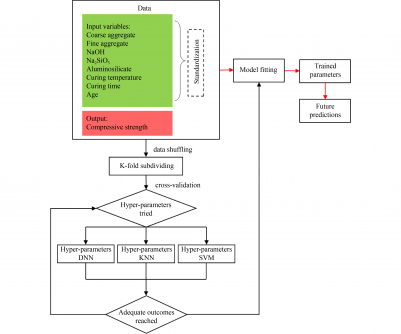Technology
Researchers Develop Machine Learning Models for Geopolymer Concrete Strength

Geopolymer concrete is increasingly recognized for its impressive mechanical properties and environmental benefits, particularly due to its compressive strength. Researchers have tackled the challenges of predicting this strength, which are compounded by the complex geopolymerization process and varying mixture designs. In a recent study, a team led by Quang-Huy LE and including Duy-Hung NGUYEN, Thanh SANG-TO, Samir KHATIR, Hoang LE-MINH, Amir H. GANDOMI, and Thanh CUONG-LE developed machine learning models to effectively predict the compressive strength of geopolymer concrete.
The research, titled “Machine Learning Based Models for Predicting Compressive Strength of Geopolymer Concrete,” introduces three distinct machine learning approaches: deep neural networks (DNN), K-nearest neighbors (KNN), and support vector machines (SVM). To build a robust database, the team collected a total of 375 experimental samples from existing literature. After thorough preprocessing, including the removal of 30 outliers and the standardization of input variables, 345 valid samples were used for analysis.
Key input variables for the models encompassed coarse aggregate content, fine aggregate content, NaOH and Na2SiO3 content, aluminosilicate content, curing temperature, curing time, and age. The output variable was the compressive strength of the geopolymer concrete. The researchers utilized the standard K-fold cross-validation method to evaluate model performance, which helped mitigate overfitting and enhanced generalizability.
The effectiveness of the models was gauged using various statistical metrics, including root mean squared error (RMSE), mean absolute error (MAE), correlation coefficient (R), and performance index (PI). The basic mean square error (MSE) served as the loss function during model training. The results highlighted that all three models successfully predicted the compressive strength of geopolymer concrete, demonstrating strong correlations between predicted and actual values.
Among the models tested, the DNN exhibited superior performance relative to both KNN and SVM. It achieved the highest correlation coefficient, approximately 0.96 for the training set and 0.89 for the testing set. Additionally, the DNN model had the lowest RMSE and MAE, as well as the least performance variability across cross-validation splits, indicating its enhanced stability and accuracy.
All models produced PI values significantly below the acceptable threshold of 0.2, affirming their reliability in predicting compressive strength. This study offers a valuable data-driven tool for optimizing the mixture design of geopolymer concrete, which could facilitate broader application in engineering projects.
The findings of this research are documented in the journal Frontiers in Structural and Civil Engineering, published in 2024, volume 18, pages 1028–1049. The full study can be accessed via DOI: https://doi.org/10.1007/s11709-024-1039-5.
-

 Technology4 months ago
Technology4 months agoDiscover the Top 10 Calorie Counting Apps of 2025
-

 Health2 months ago
Health2 months agoBella Hadid Shares Health Update After Treatment for Lyme Disease
-

 Health3 months ago
Health3 months agoErin Bates Shares Recovery Update Following Sepsis Complications
-

 Technology3 weeks ago
Technology3 weeks agoDiscover 2025’s Top GPUs for Exceptional 4K Gaming Performance
-

 Technology2 months ago
Technology2 months agoElectric Moto Influencer Surronster Arrested in Tijuana
-

 Technology4 months ago
Technology4 months agoDiscover How to Reverse Image Search Using ChatGPT Effortlessly
-

 Technology4 months ago
Technology4 months agoMeta Initiates $60B AI Data Center Expansion, Starting in Ohio
-

 Technology4 months ago
Technology4 months agoRecovering a Suspended TikTok Account: A Step-by-Step Guide
-

 Health4 months ago
Health4 months agoTested: Rab Firewall Mountain Jacket Survives Harsh Conditions
-

 Lifestyle4 months ago
Lifestyle4 months agoBelton Family Reunites After Daughter Survives Hill Country Floods
-

 Technology3 months ago
Technology3 months agoUncovering the Top Five Most Challenging Motorcycles to Ride
-

 Technology4 weeks ago
Technology4 weeks agoDiscover the Best Wireless Earbuds for Every Lifestyle









